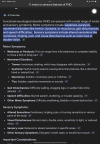Liie
Senior Member (Voting Rights)
Could it not also have made patterns appear that aren’t really there because some non-patients had something else in common?
I'm not an expert, but I don't think that is likely.
If there was a systematic error maybe there could be non-related patterns. For example if there were a lot of people with some unrelated genetic decease that could be mistaken for ME/CFS.
But if there is high error rate in the diagnosis for ME/CFS that would probably include a lot of people with various psychological illnesses such as burnout, depression and hypochondria. I don't think that would create systematic patterns in the data. It would just make the existing patterns more blurry. And I don't think blurry data would create spurious patterns. The size of the study and the statistical methods ensure that.
Last edited:


